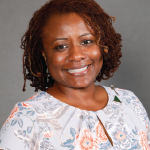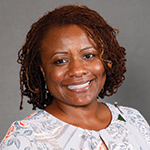This week, Hazel L. Breland, PhD, OTR/L, FAOTA, stepped into her new role as the 50th ARHP president.
Dr. Breland is an associate professor of occupational therapy (OT) at the Medical University of South Carolina in Charleston where she teaches masters students, serves as academic fieldwork coordinator for clinical placements of all entry-level graduate OT students and leads The Dr. Raymond S. Greenberg Presidential Scholars Program. She has been a member of the ARHP since 2004 and has served on the ARHP Executive Committee for the past three years as president elect (2018), member-at-large secretary (2017) and chair of the ARHP Annual Meeting Planning (AMPC) Subcommittee (2016, invited guest); she had served on the ARHP AMPC Subcommittee for the three previous years.
Bringing her unique practice and research perspectives on interprofessional collaboration and health disparities, Dr. Breland is excited to support the aims of the ARHP and put a spotlight on practice issues dear to her heart, including access to care for underserved communities. She recently spoke with ACR@Work to share her goals in this new role and discuss what drew her to OT and the ARHP presidency.
ACR@Work: What attracted you to occupational therapy, and what inspired your research related to health disparities, community involvement and interprofessional collaboration?
Dr. Breland: I learned about occupational therapy through my dad during a summer off from my undergraduate study when I took him to OT. He was working as a cement finisher to build a bridge, and his hand was crushed between concrete and steel. Being able to follow him through his therapy experience allowed me to fully appreciate the OT profession, which transformed his life by helping him regain function in his hand.
Relative to my research, health disparities are something I grew up seeing in the rural community where I was raised. I saw firsthand how determinants of health can impact a person’s life. Once I began my academic career in Charleston, just 50 miles from my home, I saw a significant gap in the advanced care I worked around compared with the often disparate care I witnessed in my home community. This drove me to study health disparity, because I felt I should be engaged in community issues, and I found that I could integrate my work in my profession, my family, my church and my community to make a difference. Being on a campus that promotes the understanding and the value of interprofessional collaboration was another perfect fit for me to tap into.
ACR@Work: Can you share some of your previous accomplishments serving in volunteer roles for the ARHP?
Dr. Breland: When I made the move to become actively involved as a volunteer member of the ARHP, I had the great privilege of being nominated to serve on the AMPC Subcommittee. This was the right role for me because I was given the chance to connect with my interprofessional colleagues [and work] toward the common goal [of shaping] an educational experience for our members that would truly educate and engage my colleagues. This committee work also gave me an inside look at all that goes into planning a professional meeting of this size and scope: It was fun, exciting and led to an incredible achievement for our team of planners and for all attendees.
I think my colleagues appreciated my excitement in this committee work because they supported my decision to chair the committee, which has given me the chance to be a part of the ARHP’s Executive Committee. In this executive leadership role, I have been given the opportunity to hear fresh perspectives from the younger members we are working hard to engage, from our more experienced members who provide insights on advocacy and access to care, and from my interprofessional committee members I have the chance to work with in fulfilling my personal goals to serve my professional community.
ACR@Work: Why did you seek the role of ARHP president, and what do you hope to accomplish in the year ahead?
Dr. Breland: I’ve experienced a lot in life that has taught me to be open and receptive to ideas and suggestions. When my ARHP colleagues came to me and suggested I pursue the presidency, I decided to go for it to continue my leadership path. I truly believe that being a leader is indeed one of the most fulfilling service roles one can have.
In everything we do in life, I feel it’s important to pursue it with passion and a sense of honesty. For me, being part of a team matters, and serving as ARHP president gives me the chance to put the spotlight on interprofessional collaboration in rheumatology practice, not only to advance the aims of our association and the College, but to also advance access to care for the growing number of patients facing rheumatic disease in this country. The ARHP proposes to help close the rheumatology workforce gap by advocating for more providers from all specialties—including physician assistants, nurse practitioners, OT and physical therapy—to provide more expedient access to care for patients; we’ll succeed in this through interprofessional connections, as rheumatology professionals work together to meet the needs of our patients.
ACR@Work: What activities do you make time for outside of your professional work?
Dr. Breland: Family, faith and food are important aspects of my life outside of work. I am very close to my immediate family; we spend a lot of time together. I’m the head chef in the family for major holidays, and I love preparing meals for my family and friends. These meals usually consist of seafood, potatoes and pasta—all my favorites. I am an early morning power walker, and I’m loving the slightly cooler weather fall brings so that I can enjoy my walks outdoors. Because I commute about 100 miles between my hometown of Walterboro to Charleston for work, I spend a lot of time enjoying music (which I love, love, love) and keeping up with news and new interests through podcasts and audiobooks.
Carina Stanton is a freelance science journalist based in Denver.


